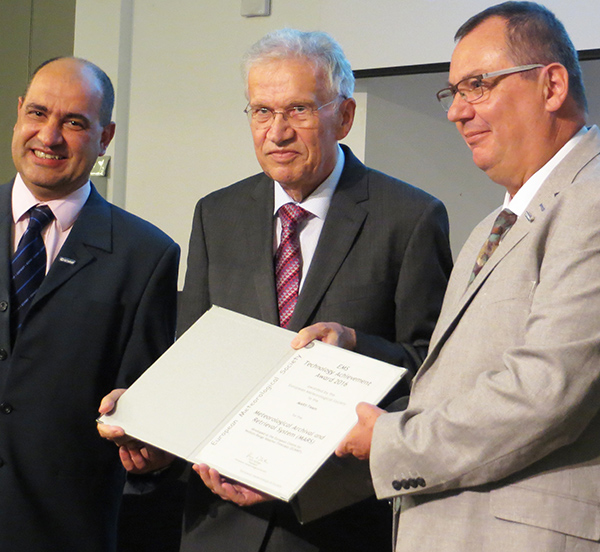A recent survey shows high user satisfaction with MARS, ECMWF’s Meteorological Archival and Retrieval System, while also highlighting opportunities for improvement.
MARS has been serving meteorological data to internal and external users for 30 years. To retrieve data from the archive, users primarily use the MARS client by calling the ‘mars’ command on an ECMWF system, e.g. the Member State server ecgate or ECMWF’s high-performance computing facility. A remote version of the MARS client had been installed at some national meteorological services (NMSs), which allowed registered users to retrieve data directly to their local system. Additional web applications, such as the MARS Catalogue, an interactive browser of the entire archive content, and an online database of meteorological parameters, are available to help users to explore the archive more efficiently.
ECMWF’s MARS team receives EMS Technology Achievement Award
The team in charge of MARS received the European Meteorological Society (EMS) Technology Achievement Award 2016 in the Italian city of Trieste on 13 September.
The award seeks to recognise influential technological achievements in meteorology and related areas.
 EMS President Horst Böttger presented the certificate to the MARS team’s senior members Manuel Fuentes (left) and Baudouin Raoult (right) during the Society’s Annual Meeting.
EMS President Horst Böttger presented the certificate to the MARS team’s senior members Manuel Fuentes (left) and Baudouin Raoult (right) during the Society’s Annual Meeting.
“MARS constitutes a unique approach to meteorological data storage and retrieval technology that has had and still has a huge impact on developments in many organisations by making vast quantities of meteorological data accessible to thousands of organisations and individuals,” Dr Böttger said in the award letter.
ECMWF’s MARS team emphasised that developing the system has been and continues to be a collaborative enterprise.
“It is an honour for us to collect this award on behalf of the many colleagues who have helped to make MARS such a successful system,” Manuel Fuentes said.
MARS is the first project to receive the award, together with the Distributed ‘real-time’ Environmental Measuring System developed at the Slovenian Environment Agency.
The remote MARS client has recently been replaced by a new service to retrieve and list archived MARS data via a Web API (web-based application programming interface). The Web API client is easy to install and can be used by many more external users, including fully registered computer users, self-registered web-only users from Member State NMSs, other web-only users registered by a Member State, and commercial customers.
Collecting feedback and measuring satisfaction is an ongoing activity at ECMWF. We issued the first survey of our computer users in 1999, then still on paper and distributed by post. In 2005 we conducted our first web-based user survey, which covered all computing services. Since then, we have issued further surveys, usually linked to major upgrades of computing systems or services, e.g. the migration to a new supercomputer.
Consequently, the introduction of the Web API offered a good opportunity to invite all our 7,600 external users with access to MARS to answer 38 questions about their use of and satisfaction with MARS and related services. To assess satisfaction and other aspects, we mostly asked users for a rating on a five-level scale, for example ranging from ‘very satisfied’ to ‘very dissatisfied’. The majority of questions offered additional text boxes and a choice to answer ‘N/A’ (not applicable). We found that the most useful feedback came from the text boxes, where users could freely express their views and make suggestions.
Summary of results
Although the users who took part in the survey have qualifications in more than 13 disciplines and work in over eight types of organisation in 50 countries, a typical respondent can probably be characterised as a meteorologist with a permanent position at an NMS, who has been an ECMWF user for more than three years, uses MARS occasionally or as needed, enjoys access to the Member State server ecgate, and has access to real-time data.
Overall, 84% of respondents are either satisfied or very satisfied with the archive content. Historical operational data are most important to them, followed by the ERA-Interim climate reanalysis and real-time operational data. The established WMO formats GRIB and BUFR are their preferred formats for fields and observations. Users who prefer fields in NetCDF format seem happy to convert the data themselves. A few users would like to see all fields offered in GRIB 2 format.
Over 90% of active users are satisfied or very satisfied with the MARS client. They appreciate in particular its high availability, functionality, and user support. The client’s data handling and computing capabilities make it the most used tool on ECMWF platforms to manipulate already retrieved data.
The satisfaction of active users with the Web API client is somewhat lower, with 74% being satisfied or very satisfied. Further analysis indicates that many users with access to both clients rate the functionality and speed of the MARS client higher compared to the Web API. Of course, when interpreting the results one needs to take into account the wide variety of respondents and the limited experience they could gain with the Web API, as this service is still fairly new.
Some users are not fully satisfied with the web-based MARS catalogue, parameter database, and documentation, reporting difficulties in finding data, descriptions of parameters, and information on the availability of parameters. This can partly be interpreted as a result of web usability issues with the migration to our current websites.
We would like to thank all users who participated in this survey. The feedback given provides us with valuable guidance on how to address our users’ needs and further improve the services offered to them.
Full survey results and more details on this and other surveys can be found in our Confluence wiki at http://software.ecmwf.int/wiki/display/UDOC/User+Surveys.

